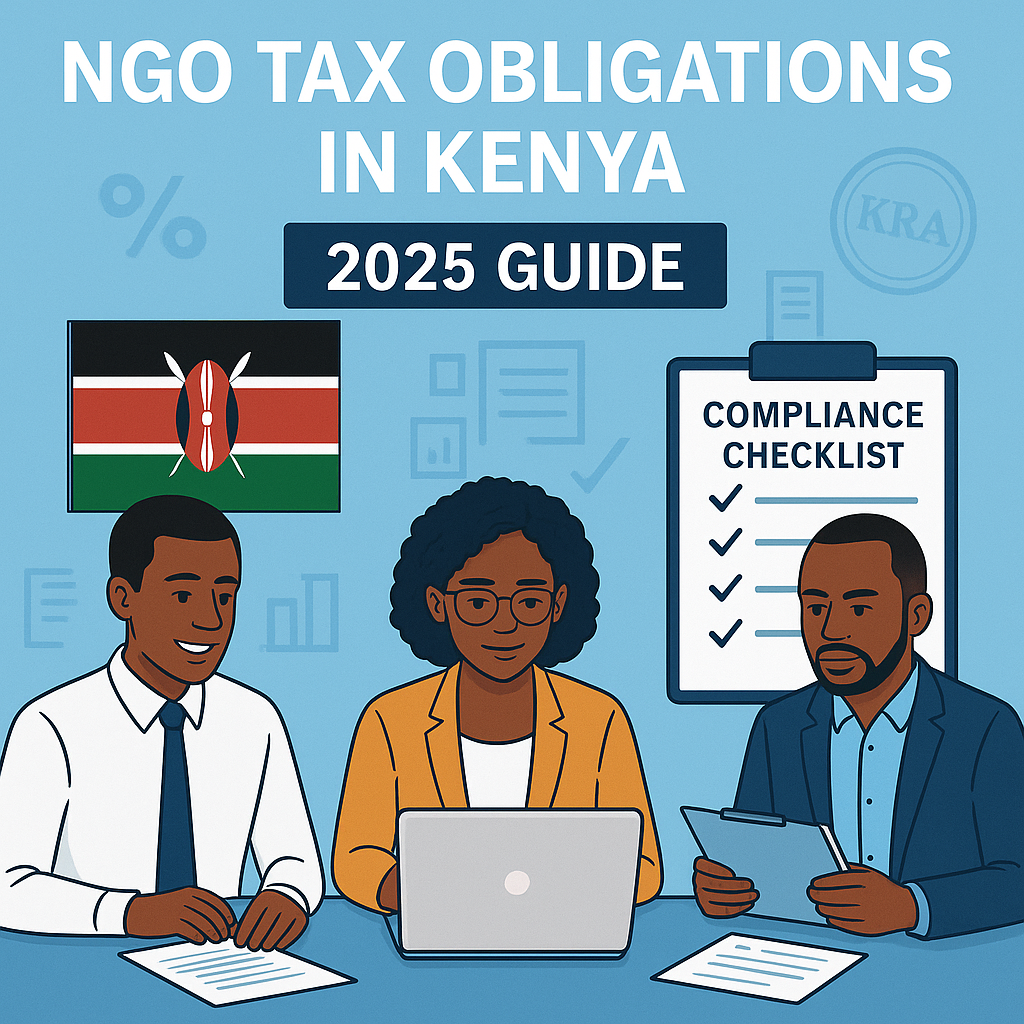📌 Introduction: Are Nonprofits Really Exempt?
Many Kenyan NGOs assume they’re automatically exempt from all taxes — but that’s not entirely true.
While public benefit organizations (PBOs), charitable trusts, and NGOs may enjoy certain exemptions, they still face legal tax obligations with KRA.
This guide explains the actual tax treatment, compliance requirements, and how to stay out of trouble in 2025.
🧾 Are NGOs Automatically Exempt from Tax in Kenya?
No. Registration as an NGO under the NGO Coordination Board or PBO Act does not give you tax exemption.
You must apply to the Commissioner of Domestic Taxes at KRA under Section 13(2) of the Income Tax Act to be granted exemption status.
✅ When Can an NGO or Foundation Qualify for Tax Exemption?
You may qualify if:
- You’re non-profit in structure
- Your income is used solely for charitable purposes in Kenya
- You’re registered with the NGO Coordination Board or PBO Authority
- You have no private benefit or profit distribution
📄 Taxes NGOs May Be Liable For (Unless Exempt)
| Tax Type | Applies to NGOs? | Notes |
|---|---|---|
| Income Tax | ❌ If Exempted under Sec 13 | Must apply for exemption |
| PAYE | ✅ Yes | On staff salaries |
| VAT | ✅ Yes | On goods/services supplied |
| Withholding Tax | ✅ Yes | On professional services, rent, etc. |
| Turnover Tax | ❌ Not applicable | NGOs are not business entities |
🪜 How to Apply for Income Tax Exemption in Kenya (2025)
- Write a formal application to the Commissioner – Domestic Taxes
- Attach:
- NGO registration certificate
- Constitution/Trust deed
- List of directors/trustees
- Financial statements
- Activity reports or project budgets
- Submit via the nearest KRA Station or upload to iTax under “Correspondence”
📌 Upon approval, you’ll receive a tax exemption certificate valid for a specific period (often 3 years).
🧾 Are NGOs Required to File Returns?
Yes. Even if exempt from income tax, NGOs must:
- File annual income tax returns (nil or otherwise)
- Submit PAYE returns monthly if they have employees
- File Withholding VAT/Income Tax if applicable
- Maintain audited accounts
💡 Common Tax Mistakes Made by NGOs
- ❌ Not applying for formal tax exemption
- ❌ Failing to deduct PAYE for staff
- ❌ Paying professional service providers without Withholding Tax
- ❌ Assuming VAT doesn’t apply on project supplies or sales
- ❌ Not renewing exemption after expiry
📊 Sample Checklist for NGO Tax Compliance
| Task | Status (✅/❌) |
|---|---|
| Income Tax Exemption Certificate obtained | |
| Registered on iTax | |
| PAYE registered and returns filed | |
| Withholding obligations complied with | |
| Annual returns filed | |
| Books of accounts audited annually |
🧠 FAQs
Q1: Can a church or faith-based group get tax exemption?
Yes — if registered and activities are charitable or public-benefit based.
Q2: Do NGOs pay tax on donor funds?
Generally no — but only if the funds are used strictly for charitable purposes and you’re exempt under Section 13.
Q3: Do we need to register for PAYE even if salaries are donor-funded?
Yes — as long as you’re paying salaries, PAYE is mandatory.
Q4: Is VAT charged on donor grants?
No — but VAT may apply if you sell goods or services (e.g., training, merchandise).
🎨 Suggested Featured Image
A diverse team of NGO staff reviewing documents in an office setting, with the Kenyan flag and a compliance checklist on a screen.
Overlay Text: “NGO Tax Obligations in Kenya – 2025 Guide”
Style: Professional but relatable, subtle KRA stamp in background
Alt text: “2025 tax compliance guide for NGOs and nonprofits in Kenya – Ushuru.com”
📊 Infographic Idea
Title: “Does Your NGO Need to Pay Tax?”
- Decision tree: Exempt or Not
- Which taxes apply
- Deadlines and documents
📣 Conclusion: Your Cause Deserves Compliance
Even as a nonprofit, you have tax obligations — from filing returns to deducting PAYE.
Staying compliant ensures:
- Continued donor trust
- Smooth KRA interactions
- Eligibility for future exemptions
👉 Not sure if you’re compliant? Reach out to Ushuru.com for a free NGO tax checklist and audit.

